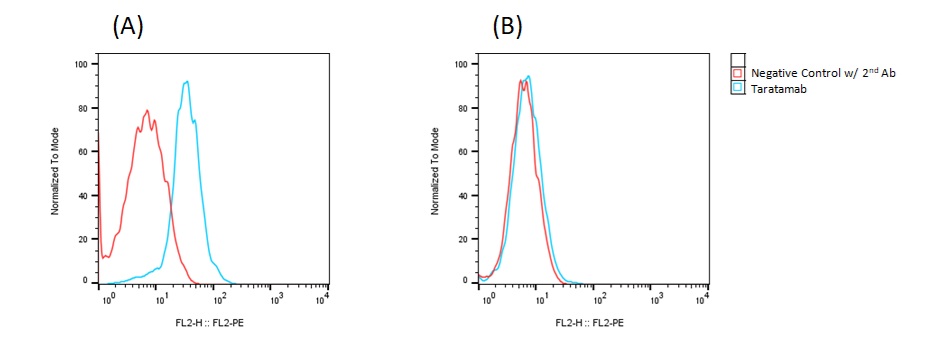
| Catalog Number | Product | Size | Price | |
|---|---|---|---|---|
| C3113 | Human DLL3-CHO-K1 Stable Cell Line | 2 vials | $2950 | Order |
| Catalog Number | C3113 |
|---|---|
| Cell Line Name | Human DLL3-CHO-K1 Stable Cell Line |
| Accession Number | NM_016941.4 |
| Host Cell | Adherent CHO-K1 |
| Quantity | Two vials of frozen cells (2x106 per vial) |
| Culture Medium | DMEM with 10% FBS, 4 µg/ml puromycin |
| Freezing Medium | 90% FBS and 10% DMSO |
| Storage | Liquid nitrogen upon receipt |
| Product Datasheet: | Download PDF |
Detection of Human DLL3 expression on Human DLL3-CHO-K1 stable cells (A) and Vector Control CHO-K1 stable cells (B) using anti-human-DLL3 antibody (Taratamab), followed by staining with PE-anti-Human IgG antibody.

Human Delta-like ligand 3 (DLL3) is a transmembrane protein that plays a pivotal role in the pathogenesis of small cell lung cancer (SCLC). Unlike other Notch ligands, DLL3 inhibits Notch signaling through cis-inhibition, primarily within the Golgi apparatus, thereby contributing to neuroendocrine differentiation and tumorigenesis in SCLC. DLL3 is minimally expressed in normal adult tissues but is aberrantly overexpressed in SCLC, with studies reporting high expression in approximately 70–85% of cases. This overexpression is often associated with the ASCL1 transcription factor, which regulates DLL3 expression and is crucial for SCLC development. The high and consistent expression of DLL3 in SCLC tumors, coupled with its limited presence in normal tissues, makes it an attractive target for therapeutic interventions. Therapeutic strategies targeting DLL3 include antibody-drug conjugates (e.g., rovalpituzumab tesirine), bispecific T-cell engagers, and chimeric antigen receptor T-cell (CAR-T) therapies. These approaches aim to selectively eliminate DLL3-expressing tumor cells while sparing normal tissues, thereby enhancing treatment efficacy and reducing side effects. DLL3 is a promising target for SCLC therapy, and ongoing research continues to explore its potential in combination with other treatment modalities.
Ding J, Yeong C. Advances in DLL3-targeted therapies for small cell lung cancer: challenges, opportunities, and future directions. Front Oncol. 14:1504139. 2024.
Furuta, K., et al. DLL3 regulates the migration and invasion of small cell lung cancer by modulating Snail. Cancer Science. 110:1–11. 2019.
Hu, Z., et al. ASCL1 and DLL3 expressions and their clinicopathological implications in surgically resected pure small cell lung cancer: A study of 247 cases from the National Cancer Center of China. Thoracic Cancer. 13:118–126. 2022.